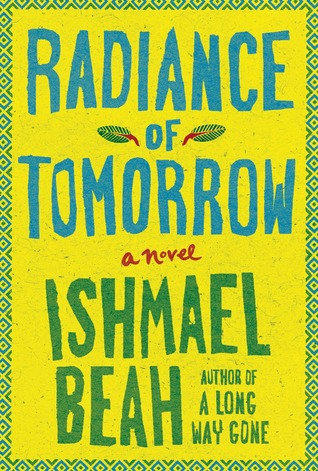
Synopsis: At the center of Radiance of Tomorrow are Benjamin and Bockarie, two longtime friends who return to their hometown, Imperi, after a devastating civil war. The village is in ruins, the ground covered in bones and drenched in deep despair. The war may be over, but the denizens of Imperi are not spared the dangers that hover over them, menacing as vengeful ghosts. As more villagers begin to come back, Benjamin and Bockarie try to form a new community by taking up their former posts as teachers, but they're beset by obstacles: a scarcity of food, a rash of murders, thievery, rape, and retaliation; and the depredations of a foreign mining company intent on sullying the town's water supply and blocking its paths with electric wires. As Benjamin and Bockarie search for a way to restore order, they're forced to reckon with the uncertainty of their past and future alike.
I've read Ishmael Beah's haunting memoir A Long Way Gone, about his years as a child soldier and how he escaped from that life. Now Beah's first novel deals with the aftermath of war and how, even though the gunfire has long since ceased, people must still must struggle to go back to their old way of life and how that is never really possible.
The book is told in an incredibly unique and poetic style. Beah writes in his author's note that he was trying to capture the rhythm and style of the oral tradition of Mende, his native language. The language is very figurative and expressive. Everything is personified - the wind, the sky, the trees, even hope.
And that's what this novel is largely about - hope. Hope that tomorrow will be better than today, hope that people will be kind and forgiving, hope that every child will be safe. But while reading it, it's hard to feel very hopeful. Misfortunes and miseries abound for the people of Imperi - injustice by greedy mining companies, abuse by hopeless men, and scarcity of food, water and money. I kept reading, hoping (there's that word again) that one of these characters would catch a break, but any reason for optimism does not come until the very end of the book - and even then it is not your traditional happy ending. It is incredibly hopeful, though.
I leave you with an incredibly beautiful and poignant passage about the novel's main theme-hope:
'The young man sits on the ground in a crowded city where he has come to look for hope. So many like him are searching for hope that it has become afraid here and is on the run. Whenever it shows itself - hope, that is - hands from the crowded streets reach for it with such violent urgency because of the fear that they may never see it again. They do so without knowing that their desperation frightens hope away. Hope also doesn't know that it is its scarcity that causes the crowd to lunge at it, shredding its robe. And as it struggles to escape, the fabric scraps land in the hands of some but last only for hours, a day, days, a week, weeks, depending on how much fabric each hand is able to catch.'
Radiance of Tomorrow, p.204
No comments:
Post a Comment